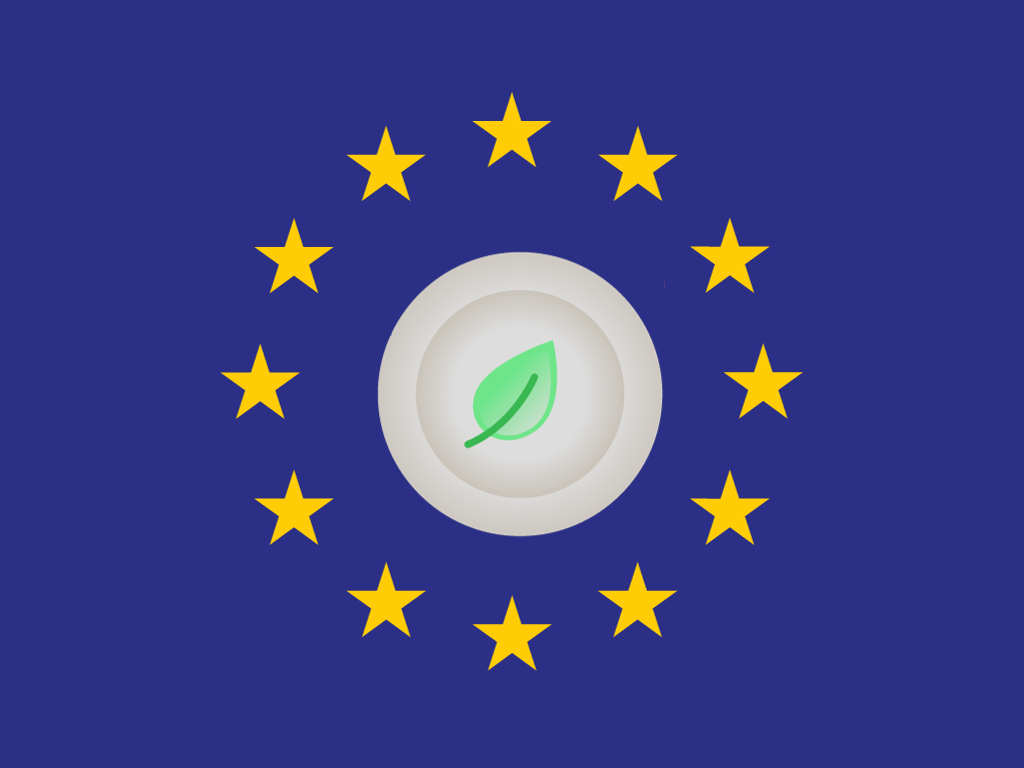8 Mins Read
Five European organisations have come together to suggest 11 measures that can unlock the region’s transition towards a plant-based food system, in a new report titled Plant-Powered Politics. In conversation with Green Queen, the coalition explains its recommendations, details the repercussions of ignoring this shift, and touches upon plant-based subsidies and proposed bans.
The report is a joint effort by Compassion in World Farming EU, the Green REV Institute (Poland), the Vegetarian Association of France, the Vegetarian Society of Denmark, and the Portuguese Vegetarian Association. The organisations focus on sustainable farming practices and promoting more plant-based protein production, with a goal to balance economic opportunities and environmental stewardship with public health and animal welfare.
They call for a redirecting of funding – in the EU, cattle farmers received at least 50% of their income through direct government subsidies between 2014-20 – towards plant-based protein production, as well as more investment into alt-protein research, given that 97% of all research and innovation spending in the same period went to animal farmers.
The coalition also recommends a rethink of the EU’s protein strategy and an acknowledgement of the link between animal welfare and climate change in the implementation of its Farm to Fork Strategy. It also suggests mandatory carbon labelling and highlighting methods of production to address the role of animals in food production.
The EU is also urged to promote its Emissions Trading System to implement environmental taxes, and charge a higher VAT and levy on meat, while consequently lowering or eliminating VAT rates on plant-based foods. Finally, when it comes to red and processed meat, the coalition recommends adding a health tax akin to tobacco taxation.
The report cites the examples of Denmark and the Netherlands as successful countries. The former’s Plant-Based Fund represents the “most substantial investment in research and development focused on plant-based initiatives made by any EU country”, while the latter has a proposed six-year master plan to increase plant protein production and consumption. It also approved cultivated meat and seafood tastings after investing €60M in cellular agriculture.
There were encouraging signs earlier this week. On Tuesday, the European Parliament’s Agriculture Committee voted to implement a strategy to increase the production of plant proteins in the EU, emphasising that it will increase the “circularity in the food and feed value chains” and benefit the climate.
Green Queen spoke to Joana Oliveira, project director at the Portuguese Vegetarian Association and coordinator of the coalition’s report, to talk about Plant-Powered Politics and the state of play for alt-protein in the EU.
This interview has been edited for clarity and concision.

Green Queen: How realistic are the chances of a meat tax being implemented anywhere in the EU?
Joana Oliveira: The implementation of a meat tax within the EU is actually a topic of growing interest, driven by the pressing need to address the significant external costs associated with farmed animals’ environmental damage and health impacts. It would require substantial political will and public support, which can vary across EU member states but environmental and health concerns are leading to discussions about the true costs of meat production. This could potentially result in policies that place upward pressure on meat prices in some regions or for specific types of meat, and that’s part of the many reasons that led us to form this partnership and develop this report.
To begin with, the EU has set ambitious climate targets, aiming for climate neutrality by 2050 and a 55% reduction in CO2 emissions by 2030, as outlined in the European Climate Law. Meat consumption is seen as a key area where progress can be made in achieving these goals due to its profound environmental consequences.
Implementing a meat tax can serve multiple policy objectives related to the animal farming industry and meat consumption. In environmental economics, this approach is akin to taxing transportation fuel, which simultaneously addresses various externalities such as air pollution and climate change. Also, since tobacco taxation has been shown to be a highly effective technique for diminishing smoking prevalence, a comparable strategy can be extended to the domain of meat consumption.
It’s important to note that for a meat tax to have a significant impact on lowering greenhouse gas emissions, it would need to be substantial, and this could affect people with different incomes. Additionally, supporting farmers in transitioning to sustainable plant-based crop production methods, investing in research and development for plant-based food innovation, and providing subsidies or grants to schools that offer plant-based meals or make them cheaper can be facilitated through meat tax revenue.
GQ: The France government has proposed a plant-based meat labelling ban. How damaging is that and the existing EU-wide ban on dairy alternatives?
JO: These bans on labelling plant-based products could limit consumer choice and transparency. Consumers rely on clear and descriptive labelling to make informed decisions about their food purchases [and] understand the texture and taste of the products they’re buying. Restricting the use of terms for plant-based products may confuse consumers and hinder their ability to choose products aligned with their dietary preferences.
Also, the plant-based industry has seen rapid growth in recent years, driven by consumer demand for sustainable and plant-based options. A labelling ban could hinder the growth of this sector and stifle innovation in creating appealing and familiar plant-based alternatives to traditional meat and dairy products.
Plant-based meat alternatives are often promoted for their lower environmental footprint compared to traditional meat production. By limiting the marketing and recognition of these products, the bans may hinder efforts to promote more sustainable food choices in line with EU environmental goals.

GQ: Livestock farming in the EU received 1,200 more public funding than plant-based meat manufacturers. How can the region level this playing field?
JO: Some interest groups are reported to employ strategies to promote animal-based products, including direct engagement with policymakers, sponsoring research papers that support their views, and utilising targeted social media campaigns. Influential agri-food lobbies seem to have been pressuring to undermine sustainable food strategies, including opposing the EU’s Farm to Fork Strategy.
Through this report, we propose redirecting European financial incentives towards sustainable farms that focus on producing plant-based proteins for human consumption and providing incentives for innovation in alternative proteins and smart farming technologies. Promoting the cultivation of plant crops for human consumption and reducing reliance on animal agriculture can positively affect public health, mitigate the environmental impact of agriculture, conserve natural resources, and promote biodiversity, but it is also crucial for economic opportunities.
Despite the Common Agricultural Policy (CAP) being in effect until 2027, the Framework for a Sustainable Food System, which we hope to be in the EC 2024 work programme, has the potential to establish a separate subsidy system that exists outside of the current CAP (until the new incentive program is eventually incorporated into the CAP during its next revision). The FSFS could set the incentives for producing plant-based food for human consumption.
GQ: 97% of all research and innovation spending in the EU has gone to animal farmers. What will motivate governments to increase their investment in alt-protein?
JO: An increase in plant-based protein sources is needed to build a more sustainable food system and for governments to meet their Paris Climate Agreement targets. Shifting towards a diet with more plant-based foods can bring substantial advantages by reducing greenhouse gas emissions, improving food security, and promoting better human and ecosystem health.
But there are also economic opportunities arising from investment in alt-protein. According to the Good Food Institute Europe, sales of plant-based foods in 13 European countries reached a record high of €5.8B in 2022, exhibiting a growth rate of 21% since 2020. Unit sales of conventional meat fell by 8% in the same period.
Increasing investment in alternative protein is crucial to ensuring Europe maintains its competitiveness in the global alt-protein industry and prevents businesses from relocating abroad due to uncertainties. Without such action, Europe risks falling behind in this rapidly growing sector.

GQ: How can governments convince more consumers to adopt plant-forward diets?
JO: Among others, it is important to consider food environments that encompass the physical, economic, political and socio-cultural contexts in which individuals engage with the food system, influencing their decisions and behaviours regarding obtaining, preparing and consuming food. These environments are shaped by factors such as the availability, information, price and advertising of food. By redesigning food environments, we can foster a transition towards greater consumption of plant-based foods.
Also, as stated in the report, establishing clear sustainability and animal welfare labelling of food products, allowing consumers to make informed choices, should be considered to promote plant-forward diets.
GQ: If the Plant-Powered Politics report’s recommendations aren’t met, what are the consequences? And by when does the coalition think these need to be actioned?
Failure to act could lead to a continuation of the high greenhouse gas emissions associated with meat production, exacerbating climate change and its detrimental effects on the environment. This could also increase deforestation, biodiversity loss, and other ecological challenges. Additionally, without a shift towards more sustainable and plant-based diets, food security may be compromised, and public health issues related to excessive meat consumption could persist.
The coalition believes that these recommendations should be considered as soon as possible. Certain measures – such as redirecting EU funding towards sustainable plant-based farming practices, supporting research and innovation, and implementing pricing instruments – may benefit from a transition period. The gradual adoption of these measures can help industries and communities adapt, avoid sudden disruptions, and facilitate a smoother transition towards a more sustainable food system.
Immediate action is necessary to mitigate the ongoing impact of meat production on climate change and biodiversity loss. Implementing these policies and initiatives, with consideration for gradual adoption in specific cases, will be crucial to achieving a more just, sustainable and resilient food system, benefitting both current and future generations.




